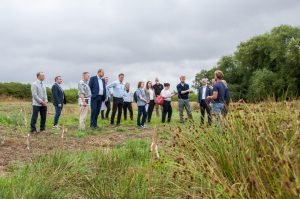
Members of the Environmental Audit Committee were hosted by the Rea Brook Demonstrator team
The River Severn Partnership (RSP) today, Thursday 17 July, hosted members of the Environmental Audit Committee (EAC) on a full-day visit showcasing its innovative approaches to flood resilience, natural flood management, and community-led adaptation.
The visit formed part of the EAC’s ongoing inquiry into flood resilience in England, with a focus on how local communities, businesses, and landowners are working together to respond to increasing flood risks driven by climate change.
The first part of the visit focused on the benefits of natural flood management and incorporated a visit to Hanwood to learn about the Rea Brook demonstrator project.
The site forms part of the Rea Brook Demonstrator, a key pilot under the Severn Valley Water Management Scheme (SVWMS) and illustrates how nature-based solutions can deliver multiple benefits for flood mitigation and the environment.
Managed by Shropshire Council and led by the Severn Rivers Trust working with local landowners, the project has demonstrated how leaky dams, wetland restoration, and land use changes can slow water flow, reduce peak flood levels, and enhance biodiversity.
In Shrewsbury, the EAC met with local businesses, including Salopian Tyres and Chase Tyres, to hear first hand how repeated flooding has impacted operations and livelihoods.
Discussions focused on the creation of a business flood action group, the role of the Shrewsbury Business Improvement District (Bid), and the importance of accessible insurance and resilient infrastructure.
The group also walked through the Riverside redevelopment area, where flood risk is being integrated into urban planning and regeneration efforts.
The final visit was to Harper Adams University, where the EAC explored the deployment of wireless water level and flow sensors, funded by the River Severn Partnership Advanced Wireless Innovation Region.
These cutting-edge technologies are being used to monitor real-time hydrological data and support the Smart Abstraction Project, which aims to balance water use with environmental protection.
Researchers and landowners demonstrated how the data can inform land management decisions and model different flood mitigation scenarios. The visit highlighted the potential of digital innovation in transforming water management in agricultural landscapes.
Ross Cook, co-chair of the RSP, said:-
“We were delighted to welcome members of the EAC and showcase the breadth of innovation and collaboration already happening across the Severn catchment through the RSP.
“From smart sensors to community flood groups, this visit demonstrates how local action, backed by national support, can build real resilience to the growing threat of flooding.
“We hope the insights gathered today will help shape future policy and investment in flood risk management.”
NOTES: The River Severn Partnership brings together local authorities, environmental agencies, academic institutions, and community stakeholders to deliver integrated water management across the UK’s longest river catchment.
For more information visit www.riversevernpartnership.org
The RSPAWIR, managed by Shropshire Council, has been awarded £4m of funding from the Department of Science, Industry and Technology, to support the growth of wireless innovation and technology in some of its key economic sectors.
The RSPAWIR’s focus is on accelerating the adoption of advanced wireless enabled technologies across three sectors which have particularly strong roots in the River Severn catchment area: water management, agri-tech and the public sector.
The SVWMS, is a partnership between the EA, Natural Resources Wales, Powys County Council and Shropshire Council with the intention to tackle flooding, support thriving communities and create resilient environments through sustainable and holistic water management.
People can also keep up to date with progress of the scheme and all the latest news and events by viewing the SVWMS website, which seeks feedback from those with an interest in the scheme.


